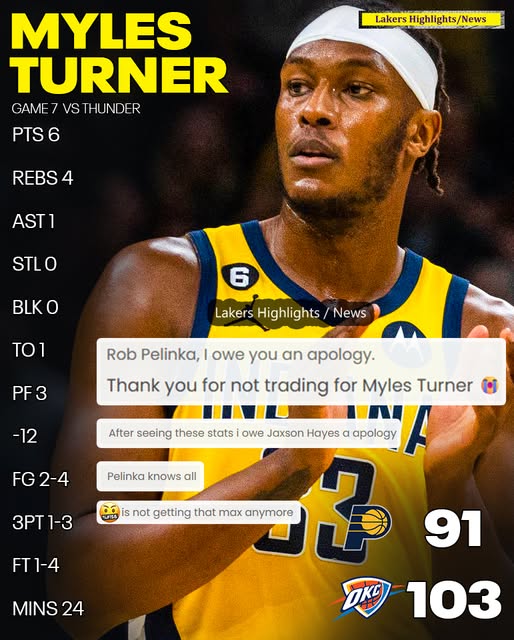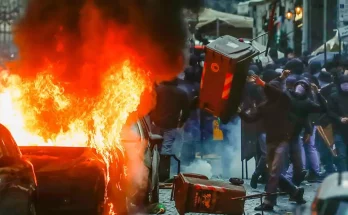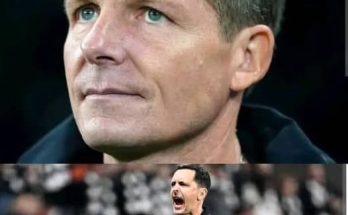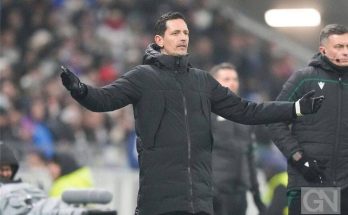The sigh of relief echoing from Southern California is as loud as any championship celebration. As the final buzzer sounded on Game 7 of the NBA Finals, bringing an end to a thrilling postseason, Lakers fans found themselves celebrating something that had nothing to do with a trophy. It wasn’t their team raising the Larry O’Brien trophy this time, but for many in L.A., a different kind of victory emerged—one that validated their front office’s restraint and silenced months of trade speculation. Myles Turner, long a subject of trade rumors linking him to the Los Angeles Lakers, finished the most important two games of his season—Games 6 and 7 of the NBA Finals—with a combined nine points. And with that, a narrative shifted, and a fanbase exhaled.
Turner, the Indiana Pacers’ starting center, had been at the heart of trade chatter for years. His name has been connected to the Lakers in countless hypothetical packages involving draft picks, cap space juggling, and often, the contract of D’Angelo Russell or other movable assets. For a team always in win-now mode and seeking rim protection and floor spacing, Turner seemed to check all the boxes. A capable shot-blocker, solid three-point shooter for his position, and only 28 years old, he had been viewed as a missing piece for the purple and gold.
However, when the trade deadline passed and the Lakers opted not to make a splashy move for Turner or anyone else of his caliber, criticism rained down. Fans and pundits alike questioned the vision of the Lakers’ front office. Could LeBron James afford to waste another season without proper support in the frontcourt? Was Rob Pelinka too passive? Did the Lakers miss their last chance to truly contend in the twilight of LeBron’s career? But as the postseason unfolded, and as the Pacers made an unexpected run to the NBA Finals, those same skeptics began to watch closely. Turner, now on the biggest stage of his career, had a chance to either vindicate or indict all the opinions formed about his impact.
The Pacers’ Cinderella story was the talk of the NBA. Led by the electrifying Tyrese Haliburton and a deep, energetic bench, Indiana’s high-octane offense and surprising defensive toughness propelled them past favorites and higher seeds. But when the spotlight grew brightest, the flaws in Turner’s game became impossible to ignore. In Game 6, facing elimination with the series tied 3-2, Turner was a non-factor offensively, scoring just four points on limited touches and looking tentative against a rugged frontcourt. Game 7 didn’t offer redemption; he added only five more points, again looking overwhelmed by the pressure and physicality of the moment. For a player expected to be a reliable third scoring option and a defensive anchor, it was a disastrous finale.
Meanwhile, Lakers fans watched with a mix of empathy and satisfaction. Empathy for a player who has never shied away from hard work and who has carried expectations in Indiana for nearly a decade. Satisfaction, though, in abundance—because the risk of acquiring Turner at the cost of future draft capital or roster flexibility now seemed not just unnecessary, but potentially harmful. Had the Lakers mortgaged their future for a player who shrinks under pressure, they might have compounded their problems rather than solved them.
Turner’s Finals performance also reignited a broader conversation in Lakerland about fit versus talent. On paper, Turner possesses all the attributes to complement stars like LeBron James and Anthony Davis. He’s a capable pick-and-pop threat, provides weak-side rim protection, and can hold his own on switches. But in games that define legacies and seasons, those theoretical strengths must translate into tangible production. What the Finals revealed is a player still struggling to find assertiveness and consistency when the stakes are highest.
In contrast, the Lakers’ own roster, while flawed, showed signs of cohesion and role clarity toward the end of the season. Rui Hachimura’s continued growth, Austin Reaves’ offensive creativity, and Davis’ dominant defense reminded fans that the existing core wasn’t as far off as critics suggested. And while the Lakers ultimately didn’t reach the Finals, they did manage to maintain cap space, preserve draft picks, and keep their options open. That flexibility may prove vital this offseason, especially as they seek to fine-tune rather than overhaul.
For years, Lakers fans have been conditioned to expect star-chasing behavior. From Kareem to Shaq to LeBron, the franchise has rarely been patient. The mere idea of passing on a name like Myles Turner—a legitimate starting center in the NBA—once felt antithetical to everything the Lakers represent. But perhaps this postseason, and the way it all unraveled for Turner and the Pacers at the very end, has ushered in a new kind of pragmatism.
Social media lit up with reactions the moment the Finals ended. Lakers fans wasted no time digging up old tweets, headlines, and trade machine fantasies that had once anointed Turner as the Lakers’ savior. Many posted memes of bullet-dodging scenes from action movies. Others simply wrote, “Thank you, Rob,” in reference to Pelinka’s decision not to give in to deadline pressure. Even some of the harshest critics softened, admitting that the front office’s caution now looked like wisdom.
This isn’t to say that Myles Turner is a bad player. Far from it. Over the course of the season, he averaged nearly 16 points, over 7 rebounds, and continued to be one of the league’s top shot-blockers. His ability to stretch the floor remains rare among centers, and in the right system, he can be a valuable contributor. But for a franchise like the Lakers—where championship expectations are non-negotiable and mental toughness is as important as skill—Turner’s inability to rise to the moment when it mattered most is a serious red flag.
The Lakers now head into an offseason full of questions: Will LeBron opt in or out of his deal? Can they land another star via trade or free agency? What does the coaching staff look like after a turbulent season? But one question they no longer have to ask themselves is whether they should have pushed all their chips in for Myles Turner. The Finals provided the answer in the harshest yet clearest way possible.
For the Pacers, the disappointment is palpable. After such a magical run, to come up short because a key piece underperformed will sting for months. Internally, they may have to reckon with whether Turner is the right piece moving forward, especially given the leap taken by Haliburton and the rest of the roster. For now, however, their loss becomes the Lakers’ quiet win.
NBA history is littered with trades that transformed franchises and others that crippled them. The Lakers have made their fair share of both. This time, they avoided the temptation to chase what looked like a perfect fit, and in doing so, preserved the chance to pursue something even better. Whether or not that something materializes remains to be seen. But for now, Lakers fans can rest easy, knowing that the one they didn’t get might have been the one that saved them.



